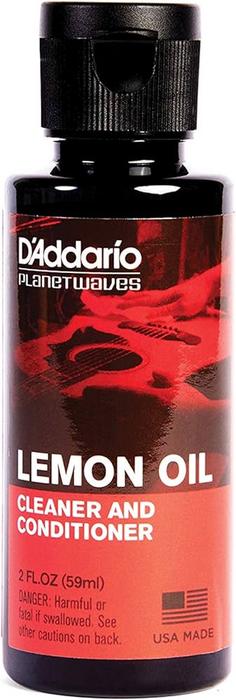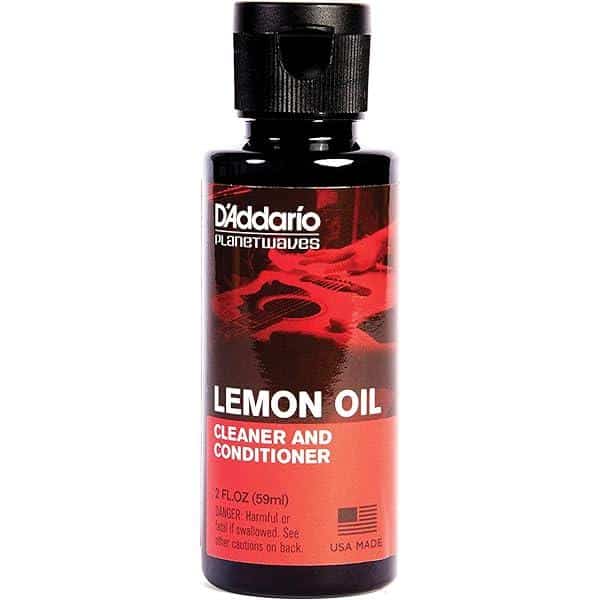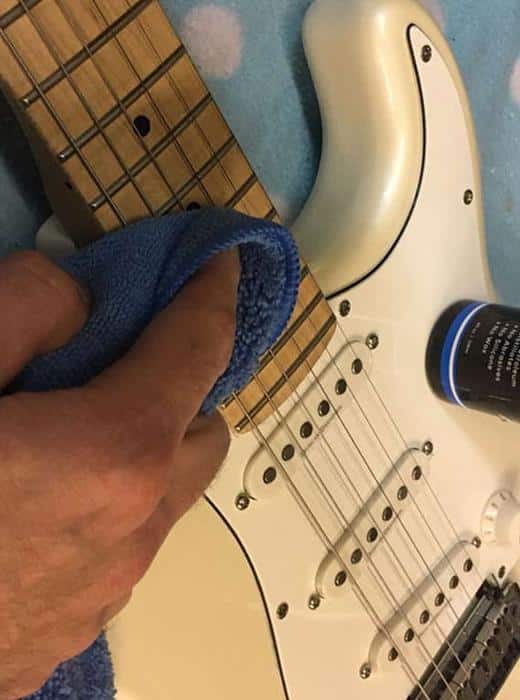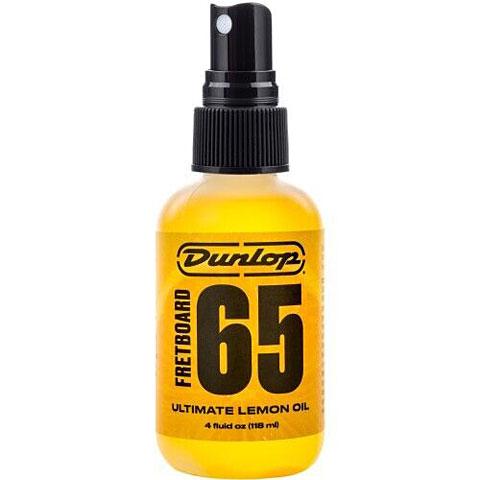Ever had that moment when you pluck a guitar string and the sound resonates so perfectly that every note feels like an enchanting symphony? The secret behind it might surprise you – it’s as simple as ‘lemon oil’, a magic elixir for your guitar’s fretboard.
As a seasoned luthier, let me tell you, such melodic perfection goes beyond just good practice. It often comes down to how well you take care of your instrument. Fretboard maintenance, although overlooked, plays an instrumental role in your guitar’s performance and longevity. And that’s where lemon oil plays its part.
Still wondering how this commonplace item could transform your music-making instrument? Brace yourself as we delve into the comprehensive journey of using lemon oil on guitar fretboards- a practice I’ve been undertaking passionately throughout my career.
I invite you to pull back the curtain and uncover the art of fretboard maintenance using lemon oil- exposing the myths, revealing the truths and everything in between. So, are you ready to make your guitar sing and dance to the tunes of smooth, well cared-for fretboards?
The Role of Lemon Oil in Guitar Maintenance
Comparison between Lemon Oil and Other Products

From my experience, thoroughly understanding the broader range of guitar care products aids in highlighting the unique role of lemon oil in guitar maintenance. When it comes to the age-old debate of lemon oil vs mineral oil, each substance has its merits and simultaneously contributes to the broader spectrum of fretboard oil alternatives.
Lemon oil, derived from lemons, is enriched with natural cleansing properties. Its ability to effectively penetrate wooden surfaces makes it suitable for deep cleansing. Furthermore, it leaves behind a pleasing citrus aroma, improving the overall guitar experience. In contrast, mineral oil is a petroleum-based oil alternative. It’s a gentler cleaner and offers prolonged hydration but lacks the deep-cleaning benefits of lemon oil.
While both are effective in their right, the key lies in understanding their individual roles and relevance. I’ve found that lemon oil strikes the right balance of cleaning, maintenance, and sensory experience, making it integral to preserving your guitar’s longevity and sound quality over time.
As we move forward, it becomes even more important to accurately discern between different products’ benefits and applications. In the broader context of guitar maintenance, every element interacts to form a harmonious symphony. The substance that fosters this synergy is none other than lemon oil.
Lemon Oil as a Conditioner

As an avid guitarist and woodcare enthusiast, my journey investigating the role of lemon oil in guitar maintenance has led me to appreciate its profound capability as a fretboard conditioner. The wood care for guitars involves regular dusting, cleaning, and conditioning; the last being of extreme significance as it replenishes the wood’s natural oils, which otherwise evaporate or get absorbed over time, leaving the fretboard dry and vulnerable to damage.
Lemon oil transforms fretboards to their former glory, restoring their smoothness and giving them a vibrant glow, emulating the sheen of a brand new guitar. My numerous trials have revealed the immediate and lasting impact it brings. The oil seeps into the wood, rehydrating it and creating a protective barrier to fend off sweat, dirt, and grime from corroding the wood.
Furthermore, the crisp, fresh aroma of lemon oil adds a sensory appeal to the guitar, refreshing not just its look, but also its smell. You see, the conditioning aspect of fretboard maintenance isn’t just about preserving the wood; it’s also about enhancing your experience with the instrument.
That being said, any form of conditioning requires a thoughtful, moderated approach. In the next section, I will delve into the subtleties of using lemon oil safely and effectively, aiming to guide you on best practices to ensure your guitar’s long and radiant life. Remember, informed guitar maintenance isn’t just an act; it’s an art.
Usage and Potential Risks of Lemon Oil
How and When to Apply Lemon Oil

My experience has taught me there’s a certain art to maintaining a guitar fretboard, and lemon oil plays an essential role in this dance. It’s not a case of just applying it whenever, but instead a schedule of disciplined upkeep.
Understanding lemon oil usage frequency is critical here. I generally suggest using lemon oil bi-annually, depending on the playing frequency and atmospheric conditions where your guitar is stored. If you use your guitar heavily, it may need more frequent oil application. Similarly, if you reside in a dry environment, you may benefit from quarterly upkeep to maintain optimal fretboard condition.
The process to clean a guitar fretboard starts by removing the strings, allowing you easy access. Then, with a soft cloth, gently spread a thin layer of lemon oil across the fretboard. Ensure the whole surface is covered, even in-between frets, but avoid a heavy-handed approach. The wood only needs a light coating to retain its health and lustre.
In conclusion, remember that successful lemon oil application hinges on moderation. Overuse might make the fretboard greasy, attracting more residue and dust. And, underuse might lead to a poorly conditioned fretboard. Strive for balance to enjoy a well-maintained guitar that not only looks good, but also produces a crisp, well-sustained tone.
As we delve further into this comprehensive guide, we’ll explore potential risks of excessive lemon oil usage, debunk common myths, and shed some light on common misconceptions. Stay tuned.
Potential Harmful Effects and Risks

Now that we’ve talked about using lemon oil on guitars, I want to touch on potential lemon oil dangers for guitars, something I’ve discovered during my years of guitar crafting.
Firstly, the type of lemon oil matters greatly. Pure, undiluted lemon oil tends to be too strong and can result in discoloration of your fretboard or even dissolve the glue holding your frets in place. It’s best to use specially formulated commercially available lemon oils designed for wooden instruments.
Another concern is the frequency of application. Often, players overly-enthusiastic about care can apply too frequently, causing the wood to become overly saturated, creating a sort of “guitar acne”. This can eventually warp your fretboard – an irreversible, costly mistake.
Finally, there’s the issue of overuse. While beneficial in moderation, continued regular use of lemon oil can make the wood lose its natural moisture, leading to the disadvantages of lemon oil on guitar – drying, cracking, shrinking, and distortion of the wood grain.
I discourage the use of lemon oil on delicate vintage fretboards, as they tend to be more fragile, and lemon oil can harm the integrity of the ancient wood and the historic varnishes used.
Next, we’ll look into the necessary precautions while applying lemon oil to avoid these potential harmful effects, ensuring the longevity of your precious instrument.
Debunking Lemon Oil Myths
Busting Myths and Misconceptions

Embarking on my journey of debunking commonly held lemon oil myths became a personal mission. Being an avid guitar player and an experimenter, I recognized the need to debunk the widespread misconceptions about using citrus oil for guitar maintenance. The time was ripe to paint a comprehensive, clear picture.
Many believe that the natural acidity of lemon oil would damage their guitar fretboards. However, most commercially available lemon oils are not pure citrus oil, they are mineral oil-based with a lemon scent, and have very little acidity. Therefore, they won’t etch into or harm your guitar.
This analysis, however, doesn’t mean you should overlook the potential negative aspects. Certain types of guitars, particularly those with unfinished fretboards, might face potential harm. Applying lemon oil judiciously is the key to ensuring the longevity and health of your instrument.
As we proceed, I’ll address other misconceptions, such as the belief that lemon oil can refinish fretboards, contextualizing these myths within the broader sphere of guitar maintenance. Dispelling these myths doesn’t undermine the significance of proper guitar care, instead, it strengthens it by encouraging better practices and more informed choices.
Understanding these lemon oil myths and misconceptions is pivotal for any guitar owner. The aim is not to discourage the use of lemon oil but to encourage its usage with proper knowledge and caution. A well-maintained guitar does not only sound better, but it also brings joy to the player, and that, after all, is what music is all about.
Can Lemon Oil Refinish Fretboards?

Exploring guitar maintenance has led me to investigate myths surrounding lemon oil, especially concerning refinishing fretboards. The truth is, lemon oil isn’t particularly useful for refinishing fretboards, contrary to popular belief. Its utility resides more in its moisturizing and cleaning properties rather than refinishing abilities.
Refinishing fretboards is a task requiring a fresh layer of wood and lacquer, a restoration job beyond the scope of lemon oil’s capabilities. Lemon oil is largely composed of mineral oil with a hint of lemon scent, rather than being the pure extract of lemon. Its ingredients are more suited for removing dirt and grime while hydrating the fretboard. However, the notion that it can aid in the process of refinishing a fretboard is inaccurate.
Furthermore, understanding how to properly maintain your fretboard also involves knowing how to remove lemon oil from your guitar. Used moderately, it’s unlikely you’ll need to remove it, as the wood generally absorbs it. If excessively applied, wiping down with a dry, lint-free cloth efficiently removes the excess. Consistently in my work, I’ve analogized this to overwatering a plant—it doesn’t need a waterfall, just a sprinkle!
In conclusion, as we continue debunking myths about lemon oil, it’s crucial to separate its real merits from inflated claims. As we’ve seen, lemon oil is a beneficial conditioner for your fretboard, but its role should not be misconstrued. It is not your go-to solution for refinishing duties.
FAQs
What is lemon oil?
Why should I use lemon oil on my guitar fretboard?
How often should I use lemon oil on my guitar fretboard?
What are the steps to apply lemon oil on a guitar fretboard?
Conclusion
Closing the curtain on lemon oil: What have we learned about its use with guitars? Through my journey as a luthier, I’ve discovered that lemon oil can be an incredibly versatile tool in guitar maintenance. It serves as a great conditioner for the guitar fretboard, providing essential moisture that other products may not offer. However, its usage is not without potential risks to be aware of.
Through thoughtful application and careful consideration, the potential harmful effects and risks can be mitigated. Understanding this, it’s important to debunk common myths and misconceptions. Lemon oil doesn’t refinish fretboards, but it definitely helps in cleaning them and aiding in their longevity. Despite the rumours, it’s yet another tool in our guitar care arsenal, not a magic bullet. This can lead to more informed decisions regarding your guitar cleaning process.
As I bring this guitar-string narrative to its final note, remember: lemon oil has a role in guitar care, but it requires mindful usage. Embrace it as part of your guitar maintenance toolkit. This guide was created to help fellow guitar enthusiasts better understand the specifics of lemon oil guitar fretboard care, and I hope it does just that. Don’t fear the lemon, but respect it!
